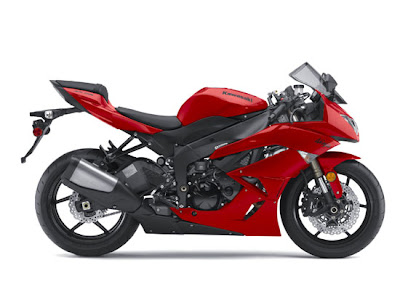

 Hats off to the Kawasaki Ninja® ZX™-6R then, winner of 600cc comparison tests in just about every publication and website of note on the planet. With an engine the critics agree feels bigger than 599cc, and a chassis that out handles all others, the ZX-6R returns as the bike to beat in 2010.
Hats off to the Kawasaki Ninja® ZX™-6R then, winner of 600cc comparison tests in just about every publication and website of note on the planet. With an engine the critics agree feels bigger than 599cc, and a chassis that out handles all others, the ZX-6R returns as the bike to beat in 2010.With a fine-tuned chassis including a class-exclusive Big Piston Fork and fully adjustable shock out back, razor-sharp handling sets the ZX-6R apart. To optimize front-rear rigidity balance, frame stiffness around the swingarm pivot and the rear engine mounts is carefully tuned, with the compact engine rotated forward around the output shaft for a steep cylinder bank angle and optimal center of gravity. An exhaust layout with a short side muffler keeps the weight low, and an exhaust pre-chamber further contributes to the ZX-6R’s mass centralization.
But Kawasaki didn’t just declared themselves satisfied with that, it needed to bring that power and torque to the rider’s right hand without this involving jerks, only smooth and instant throttle response and control. In order to achieve that, engineers added cylindrical guides to the top of the air cleaner box, bringing chirurgical precision to air intake systems and getting the maximum bang from every fuel load going into the cylinders. The throttle bodies were lengthened, increasing distance between oval sub-throttle and round main throttles 10mm, resulting in a much smoother transition, reducing inlet turbulence and increasing efficiency. Also, the cylinder porting and ignition coils were revised in the quest for performance.
As weight is a key factor, the making of this inline-four involved finding solutions for reducing it. And if that meant making the camshafts from SCM, revising the top injector mounting plate, narrowing the transmission gears, revising and relocating coolant reservoir and heat pads, Kawasaki engineers didn’t boggle in doing it.
Keine Kommentare:
Kommentar veröffentlichen